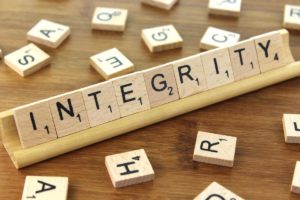When Erin and I were identifying what would be the guiding values of Culture of Safety, we each contributed two. Erin said that procrastination couldn’t be one of them (they asked me to write this article a month ago), so my contributions are “Equity” and “Integrity.” It so happens that “Integrity” is the “I” in the BRAVING inventory. It was important to me that it be one of our defining values based on my experience at an organization I used to work for (which I’ll just call ‘Org’ in this post); one that taught me the consequences of losing my integrity.
 Brené Brown defines ‘integrity’ this way: “Integrity is choosing courage over comfort; it’s choosing what’s right over what’s fun, fast or easy; and it’s practicing your values, not just professing them.”
Brené Brown defines ‘integrity’ this way: “Integrity is choosing courage over comfort; it’s choosing what’s right over what’s fun, fast or easy; and it’s practicing your values, not just professing them.”
In the experience I alluded to in the opening paragraph, there was an inciting incident that created turmoil, and there were responses to the inciting incident. While I agreed with the initial responses to the inciting incident, I soon began to see Org suffering from what I perceived as both a lack of transparency and a disinterest in facilitating healing. These were related, because healing necessarily involves talking about what happened. I was in a minor position of leadership, and I reluctantly agreed with the choices made, because I feared what would happen to Org otherwise.
But a large part of me clearly didn’t agree with it, because for the remainder of the time I worked there, I was miserable. My journal entries from that period almost all begin with some variant of, “I remain in hell,” or “Everything is awful.” Looking back, I recognize now that I was outside of my integrity. I chose comfort over courage, and what was easy over what was right. When decisions were made that I didn’t agree with, I didn’t speak up publicly. I expressed my concerns privately, but allowed myself to be overruled.
Ultimately I lost that job. It felt calamitous at the time, but ended up being a gift in disguise. While it took me a long time to process it (and in some ways I’m still processing it), I was no longer in constant pain. I was plenty panicked about not having a job, but even that stress was a more peaceful experience than those final months had been.
 Integrity is especially important when you’re trying to lead a values-driven organization, as we are at Culture of Safety. We will (and should be!) watched to see if we actually live up to the values we profess, and I hope that our community holds us accountable to those values. It’s not pleasant to hear that someone thinks you’ve lost your way, but that feedback is so very important, because I think it’s safe to say that nobody in a values-led organization intends it to be hypocritical.
Integrity is especially important when you’re trying to lead a values-driven organization, as we are at Culture of Safety. We will (and should be!) watched to see if we actually live up to the values we profess, and I hope that our community holds us accountable to those values. It’s not pleasant to hear that someone thinks you’ve lost your way, but that feedback is so very important, because I think it’s safe to say that nobody in a values-led organization intends it to be hypocritical.
Now it’s your turn: Have you ever lost sight of your integrity? Been involved with someone (or an organization) that lost theirs, and spoken up about it (or didn’t)? What was it like? How did it resolve?

Pingback:6 Ways to be More Supportive of Trans and Non-binary Folks | Culture of Safety